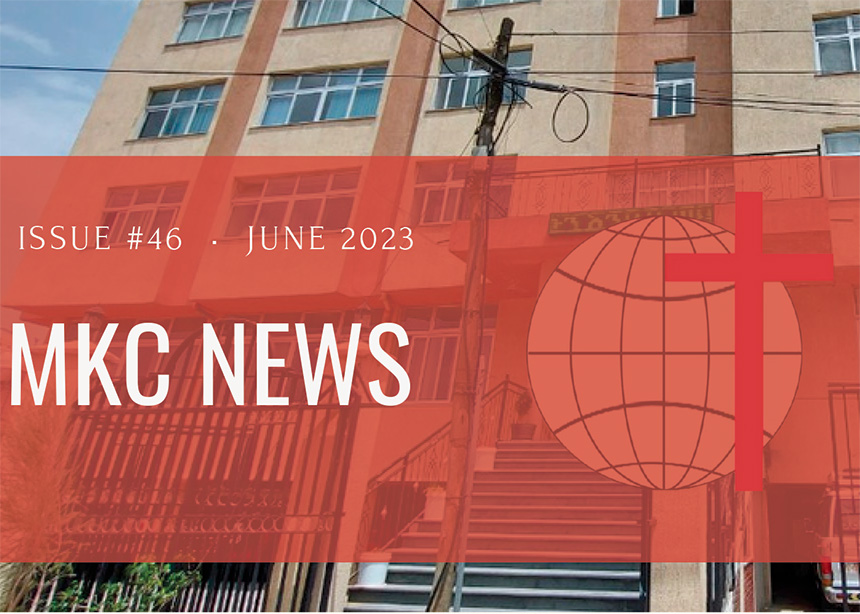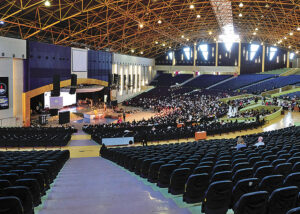The fact that Mennonites are spread throughout much of the world provides the global Anabaptist community with rare access to on-the-ground, first-person comment from both hotspots and forgotten corners of the globe.
Sometimes we make good use of this access, sometimes we do not.
In this issue—the first of three digital-only issues this summer—we hear from Ukraine, where the headquarters of the Mennonite Centre has been occupied by Russian forces, and from Ethiopia, where the remarkable prison ministry of Mennonites has led to ex-prisoners planting a church. (Plus, a great story of faith from Ethiopian Canadian Fanosie Legesse.)
Ukraine
Decisions about Ukraine coverage are tricky. It’s a war that naturally draws media attention. Ukrainian president Volodymyr Zelensky is a PR genius. A segment of Mennonites in Canada have emotional and family ties to Ukraine. Many Canadians interact with Ukrainian refugees. Our government is directly involved.
This all makes it easy to cover. It’s right in front of us.
Of course, it warrants coverage. It’s a big deal in terms of geo-politics and human suffering. The stakes are high and the stories horrific.
The flip side is that coverage of Ukraine tends to overshadow less media-friendly, though equally troubling, conflicts and disasters, of which there is no shortage. They far outstrip our attention spans.
Ethiopia
To me, the short article in this issue about Ethiopian prison ministry stands out for a reason many readers might miss.
The piece is a reprint from MKC News, a publication of the Mennonite denominational body in Ethiopia. That means it is an Ethiopian person reporting on work by the Ethiopian church for an Ethiopian audience (primarily) in an Ethiopian publication.
This makes it fundamentally different than almost every other piece of information I have received about the Global South from church (or other) sources in my life.
Usually what we hear from abroad is from:
- a writer sent from North America by a church organization to report back (even though the Global South is home to hundreds of millions of people who speak English and could use a paycheque); or
- a North American living abroad reporting on what they see; or
- someone from the Global South who is speaking directly to a North American audience in the awareness that he or she is, in some sense, the guest of the audience, and his or her organization and/or community is in part dependent on money from the audience. (That changes what you say.)
All those means of communication are valuable and legit. And limited. They tend to fit into the us-helping-them narrative, a narrative so central to the identity of Euro-North American Mennonites. They tend to put us above others and often make us both the gatekeepers of information and the protagonists or co-protagonists.
These standard forms of discourse are also commonly linked to money. They are very often aimed at our wallets—not exclusively at our wallets, of course, but that dynamic often lurks.
Materials from Mennonite World Conference are often an exception in that people from the Global South can speak at length (not just as interview subjects) on their own terms.
The MKC News article about prison ministry is, perhaps, not that different in content than if it had been written by a visiting North American writer. But, to me, it points to a great possibility.
I believe God has given people in different places gifts of spiritual value. We will miss those gifts if we are locked into the us-helping-them narrative. That narrative too often ends up pointing, implicitly, to our own goodness and virtue rather than to the message God has given others to share.
Yes, sometimes help is wanted and needed. But spiritual transformation is also at hand.
All aboard
Finally, John Longhurst is providing daily blog updates from the “Memories of Migration” cross-country train tour marking 100 years since the “Russlaender” Mennonite started arriving in Canada from the former Soviet Union. His recap of the first leg of the trip is included in this issue.
Will Braun welcomes feedback at editor@canadianmennonite.org.
Read more editorials:
The poofy blue MCC couch
The duty of tension
Countering intuition
How I almost bought a Tesla
In-house acknowledgment








Leave a Reply
You must be logged in to post a comment.